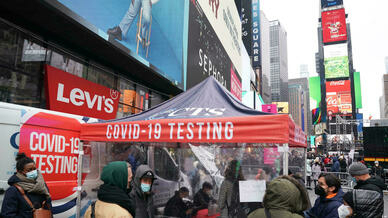According to a university tracker, the moving seven-day average of new cases was 265,427 on Tuesday, exceeding the previous high of 251,989 established in mid-January 2021.
Because of a scarcity of testing and results from home tests not being included, Harvard epidemiologist and immunologist Michael Mina tweeted ahead of Johns Hopkins publishing the data that the count was likely the “tip of the iceberg,” with the real number of cases likely significantly higher. The extensively mutated Omicron strain, which accounted for about 59 percent of national US cases in the week ending December 25, is the most transmissible observed to far, according to official models.
- Do you have a cold, the flu or Covid-19? Experts explain how to tell the difference
- Mikel Arteta: Arsenal manager to miss Man City match with Covid-19
It can commonly override preexisting immunity acquired by vaccination or illness. Despite the fact that the likelihood of severe outcomes looks to be reduced, Omicron is already straining already overburdened hospital systems across the country, with health care staff quitting in droves due to exhaustion. To fill shortfalls, hospitals are resorting to “travel nurses” on lucrative short-term contracts. According to the Des Moines Register, the state of Iowa was paying a business $330 an hour to provide nurses who would be required to perform 20 hours of overtime.
According to statistics gathered by the Centers for Disease Control and Prevention (CDC), almost 9,000 Covid patients are hospitalized per day nationwide, a far cry from the peak of 16,500 per day reported in January, however this is a lagging signal.
Around 1,200 people were dying on average every day on December 23, the day before data collection was disrupted by Christmas holidays. In January, deaths peaked at an average of 3,400 a day. The crisis is increasingly a political liability for President Joe Biden, who as a candidate slammed his predecessor Donald Trump for his failure to manage the pandemic and promised to perform far better. Amid the worrying news, America was also looking to tentative signs of hope from countries further along their Omicron waves.
Experts are hoping that the country’s experience will be more like a “flash flood” as seen in South Africa, where it was first reported in mid-November but where cases have been receding since more than a week. In Britain, where cases have also skyrocketed, new Covid deaths have so far remained flat.
More than 820,000 Americans have died from Covid, making the United States by far the hardest-hit country in the world, ahead of Brazil and of India.By October, the latest month for which data has been analyzed, unvaccinated people had a five times greater chance of being infected with Covid, and 14 times higher chance of dying, compared to vaccinated people.Though that data does not account for Omicron, accumulating research shows that vaccination and boosting continue to protect well against severe outcomes.
The latest milestone comes as the CDC shortened recommended times that people should isolate after a positive test from 10 to five days, so long as they do not have symptoms and continue to wear a mask.
The move was praised by airlines and the hospitality industry, but public health experts criticized the decision to omit a requirement for a negative Covid test — even via rapid antigen, which correlates well with infectiousness.





